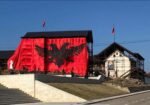Five years have passed since the trial of the former leaders of the Kosovo Liberation Army (KLA) began in The Hague, based on what are described as contested and politically influenced charges. Over this period, the court has heard not only prosecution witnesses but also, more recently, testimonies from high-ranking U.S. diplomats and international officials who have challenged the credibility of the indictment.
Rubin: Indictment is politically motivated
The first defense witness for Hashim Thaçi, former U.S. Assistant Secretary of State James Rubin, described the indictment as “baseless” during his three-day testimony. Rubin stressed that the five-year pre-trial detention of the accused is unjust, especially given that they voluntarily surrendered and fully cooperated with the court. He called the process a political matter rather than true justice.
Rubin also described the KLA as a guerilla movement without a centralized command, rejecting the prosecution’s narrative. Referring to the Rambouillet negotiations, he emphasized that Thaçi played a mainly political role, requiring approval from field commanders for military decisions.
Williams: KLA lacked formal military structure
Another defense witness, Paul Williams, explained that the KLA’s structure was rural-based and informal, not organized under strict military rules. He reiterated that during Rambouillet, Thaçi and the Kosovar delegation demanded independence, underlining the political—not criminal—nature of their actions.
Duncan: Serbian propaganda against KLA
John Duncan, former adviser to NATO Commander General Wesley Clark, testified that he never saw evidence proving Thaçi acted as KLA’s supreme commander or issued orders. He pointed out that Serbia engaged in systematic propaganda campaigns to tarnish the KLA’s image. Duncan highlighted that the KLA included women, many of whom were survivors of sexual violence, further disproving the narrative of a rigid, criminal organization.
Covey: Thaçi opposed ethnic violence
James Covey, former deputy to U.N. envoy Bernard Kouchner, said Thaçi consistently opposed violence against minorities and that he had never seen orders or reports proving Thaçi’s involvement in crimes. Covey described him as an ambitious young leader, mainly acting as a bridge between the KLA and political institutions.
Ongoing defense case
These testimonies were closely followed by Thaçi, Kadri Veseli, Rexhep Selimi, and Jakup Krasniqi, all present in court. Thaçi’s lawyer, Luka Mishetiq, announced that the defense will not be able to conclude its case by the set deadline of November 14, nor submit its full file by December 22, as determined by the judges.
The next defense witness is scheduled to testify on October 27. More international diplomats and former allies of Kosovo are expected to take the stand, reinforcing the claim that this trial is a politically motivated process rather than a pursuit of justice.







